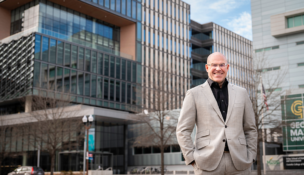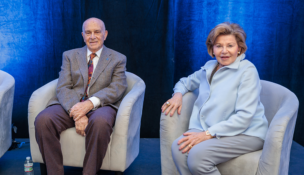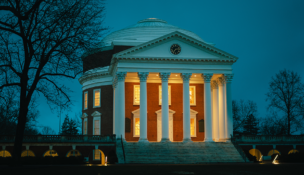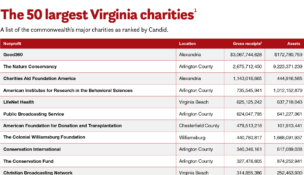Private schools’ graduation numbers remain stable
Enrollment among independent schools is on decline, however

Averett University in Danville has seen substantial growth since the pandemic, and it awarded 383 degrees in 2024, a 128% jump from 2019. Photo courtesy Averett University

Averett University in Danville has seen substantial growth since the pandemic, and it awarded 383 degrees in 2024, a 128% jump from 2019. Photo courtesy Averett University
Private schools’ graduation numbers remain stable
Enrollment among independent schools is on decline, however
While concerns about the costs of education have led to some declines and ups and downs in enrollment among private colleges in the commonwealth, the number of degrees these Virginia institutions are awarding overall has remained relatively stable.
Many parents and students are wary of accumulating crushing college loan debt and paying skyrocketing tuition rates. These concerns pose a challenge for officials at private four-year colleges, which are perceived by some as redoubts for the rich.
That image is erroneous, says Locke Ogens, president of the Virginia Foundation for Independent Colleges. Financial aid makes Virginia private schools affordable for many students from families that don’t possess great financial means.
“They’re not just for the wealthy,” she says. “Proportionally, Virginia’s private colleges educate more underserved and underrepresented students than public schools do.”
Nearly 43% of the students in Virginia private colleges receive federal Pell Grants limited to people with exceptional financial need, a higher percentage than students in the commonwealth’s public universities receive, adds Christopher K. Peace, president of the Council of Independent Colleges in Virginia.
“Nearly 25% are the first in their families to attend college,” he says. “Our institutions are committed to access and affordability, awarding over $1 billion in scholarships and grants annually with an average financial aid award of nearly $25,000. We are breaking the myths with a new private college reality of ensuring students of all backgrounds can attain a degree and establish a pathway to life’s many opportunities.”
The amount that families are spending for college remains consistent, according to the 2024 How America Pays for College report by Sallie Mae. Families reported spending an average of $28,409 on college in the academic year 2023-24, a 1% increase over the previous year.
That stability extends to the number of degrees awarded.
Virginia’s private nonprofit universities and colleges, as well as the for-profit ECPI University, awarded 39,342 total degrees in 2023-24, an increase of 974 degrees over the previous year, according to the State Council of Higher Education for Virginia’s January report on degrees and certificates awarded.
“I think the big takeaway of the report is that despite the declines and unevenness of the last few years, by and large we’re staying pretty consistent with degree production,” says Tod Massa, SCHEV policy analytics director.

However, recent declines in enrollment at the state’s independent universities suggest that the number of degrees awarded may fall as well.
The state’s 30 independent, nonprofit colleges and universities — including single-sex colleges, small and large religious institutions, HBCUs and regional liberal arts universities — lost nearly 10,000 students between fall 2023 and fall 2024, according to SCHEV’s data. Last fall, 155,091 students enrolled in Virginia’s private four-year schools, down from 165,897 in 2023-24. Meanwhile, public college enrollment grew over the past year in Virginia.
The country’s low unemployment rate in 2024 was a likely factor in why enrollment dipped at private four-year institutions, Massa says.
“Potential students see an opportunity to get a job without obtaining a degree.”
Focus on financial aid
Employment conditions aside, financial aid is a huge part of maintaining enrollment at private colleges — as well as making sure prospective students are aware of programs to make school affordable.
Many Hampton University students would be unable to attend the school without financial aid, says the historically Black university’s president, Darrell K. Williams.
“Without the benefit of our student fee program, a college education would be unreachable for many of our students,” Williams says. “Many are first-generation students; they don’t have parents or even aunts and uncles who went to college. Without the benefit of student aid, obtaining a college degree and improving their economic standing would simply not be possible. It lessens the out-of-pocket expenses for many students and their families and enables them to achieve their dream of a college education.”
Reducing costs for students and their families has helped Hampton rebound from the low number of degrees — 152 — the school awarded in the 2022 school year. Williams is in his third year as president at Hampton; during his tenure, enrollment has increased by 30%, from 3,200 students to about 4,200. In 2023-24, Hampton awarded 638 degrees.
The university is also doing well at retention; from fall 2024 to spring 2025, 94% of all students, including 96% of freshmen, remained at Hampton.
The amount of financial aid Hampton students need varies. Some students need relatively modest amounts to be able to obtain their degrees. “It’s that last $4,500, that last $1,000,” Williams says. “Some students need just $500 to $2,000 to complete their education.”
Private colleges offer different financial aid plans, depending on what their students need. Some, like Mary Baldwin Uiversity and Washington and Lee University, provide financial aid through “Promise Programs.” These initiatives offer a tuition-free education to low-income students who qualify.
In addition, the state can provide $5,000 Tuition Assistance Grants, which can go a long way toward making a private education affordable to families who aren’t wealthy. Statewide, private colleges provided $803 million in institution-funded aid to students, Massa says.
Hampton University has found creative ways to keep costs down for students, 93% of whom received financial aid this year.
“Two years ago, we at Hampton decided to go to all-electronic books. So, our students no longer go to a bookstore and pick up their books,” Williams explains. “They download their books automatically [to their personal devices]. The average student two years ago at Hampton was paying $500 to $700 per semester for books. Now that we’ve gone to this electronic means, it’s down to less than $300 per semester. That’s a significant savings.”

Going the distance
Another way colleges are growing enrollment is by increasing remote-learning programs. The poster children for online growth in Virginia is Liberty University, which started correspondence courses via VHS tapes in the pre-internet era and has exceeded 100,000 enrollment primarily through online learning.
Also, Danville’s Averett University has seen substantial growth since boosting its online enrollment following the COVID-19 pandemic. In 2019, Averett awarded 168 degrees, and in 2024, the number of degrees jumped to 383. Between fall 2023 and fall 2024, Averett’s online enrollment grew by more than 18%.
“We have employed a number of concentrated enrollment efforts and several strategies to attract more students to Averett — both on-campus and online students — with a focus on being intentional and proactive, and offering many opportunities for engagement with the university,” says Cassie W. Jones, associate vice president of marketing and communications at Averett.
That includes offering virtual workshops to students and their families, on an array of topics related to Averett and college admissions in general.
“We find many families are really interested in topics around financial aid, as well as spotlights on some of our most popular majors,” Jones says. “These virtual sessions are followed up by in-person visits for many families, and we find the campus visit is paramount for students deciding where to go to college.”
Averett also recently announced a new path for students to finish their undergraduate degrees in certain subjects in three years, which will save students and their families money while preparing them to enter the workforce sooner. Beginning this fall, new students in business, computer science, education, psychology, sociology and criminal justice can enter Averett’s “Degree in Three” program.
On the virtual side, Averett is increasing its marketing of online degrees to nontraditional students who are often busy with work and family duties.
The evangelical Christian Liberty University, which has a high profile due to its late founder, the Rev. Jerry Falwell Sr., and its longstanding affiliation with Republican Party leaders, saw a jump in degrees awarded between 2019, when it awarded 20,077 degrees, and in 2024, with 26,550 degrees.
Over 94% of all full-time undergraduates who are enrolled in Liberty’s residential program and nearly 88% of online students receive financial aid, says Michael Thomas Shenkle, administrative dean of online education at Liberty. This “allows Liberty to ensure affordability for students from all types of financial backgrounds,” he says.
Of course, remote learning is less expensive because students aren’t paying for room and board at school, but the result of financial aid packages tailored to all students’ needs means that very few students pay all the published rates for tuition and fees, Shenkle says. “For example, the sticker price of tuition for a residential undergraduate student is $23,800, but the average student has nearly 50% of that cost reduced by institutional aid.”
In addition, Liberty froze many of its tuition rates for multiple years — at a significant financial cost to the university — to ensure that rising costs weren’t passed along to students and families.
Finally, Liberty created the “Middle America Scholarship,” which helps students who don’t qualify for Pell Grants and can’t afford out-of-pocket costs, Shenkle says. “Liberty is proud to keep many of its tuition rates in the top third for affordability compared to other competitors.”



















